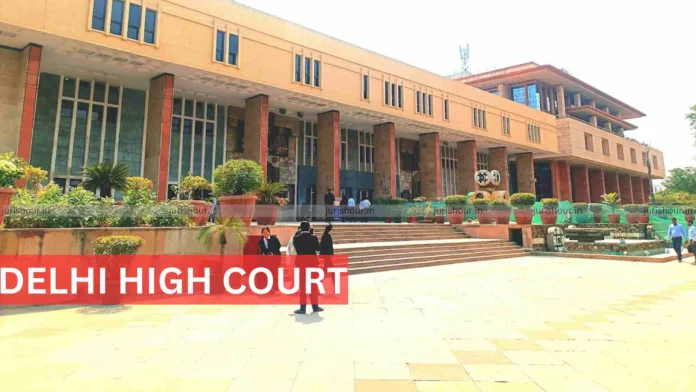The Delhi High Court held that the penalty for GST evasion under Section 122(1A) of the Central Goods and Services Tax Act 2017 is applicable on ‘Any Person’ whether taxable or non-taxable.
The bench of Justice Prathiba M. Singh and Justice Rajneesh Kumar Gupta the language used in Section 122(1A) of the CGST Act is ‘any person’ which is also the language used in Section 83 of the CGST Act. The term any ‘any person’ is used in contradictory distinction with ‘taxable person’ and in the said judgment of the Bombay High Court in the case of Bharat Parihar V. State of Maharashtra & Connected Matters has clearly held that the phrase ‘any person’ would include a non-taxable person.
The Petitioners are stated to be the directors of one M/s Planman HR Private Limited (hereinafter, ‘company’) which was engaged in the business of manpower recruitment. An investigation was conducted against the company wherein it was revealed that CENVAT credit to the tune of Rs.22,41,07,389/- had been availed by the Petitioners which was inadmissible.
The Petitioner, Gurudas Mallik Thakur was at that time arrested for making false entries in the Service Tax Returns on 21st August, 2020 under the Finance Act, 1994. Thereafter, the SCN was issued and in addition, the Goods and Service Tax Returns were also thoroughly enquired into.
The case of the Central Goods and Service Tax Department is that the company had not filed proper returns. Under GSTR-1M, returns were only filed till February, 2019 and GSTR-3B was filed only till December, 2018.
The returns were then called upon to be filed by the company. Subsequently, the Department found that both the directors took a position that one Mr. Arindam Chaudhary who was the promoter and 90% shareholder of the company was the decision maker in the company.
After recording the statements of both the Petitioners, the company was called upon to produce documentary evidence. The balance sheets of the company were also reviewed by the Department.
The Department contended that there was a short payment of GST to the tune of Rs.40,61,37,843 by the company and the same was liable to be recovered under Section 74 of the Central Goods and Service Tax Act, 2017. Inadmissible Input Tax Credit (ITC) was also alleged to be availed of by the company. Moreover, copies of tax invoices and debit notes were not supplied to the Department. The persons who were investigated by the Department included the two Petitioners, Mr. Arindam Chaudhary and Mr. Varun Khanna.
According to the order, none of the directors owned up to the responsibility of filing GST Returns for the company. The Petitioners claimed that they have resigned from the company in 2020 and that Mr. Arindam Chaudhary was the main person running the company. The Petitioners have also stated that Mr. Varun Khanna was the Chief Executive Officer of the company. The replies filed by the Petitioners were also considered by the adjudicating authority.
The adjudicating authority vide passing the impugned order held that the demands were liable to be paid by the company as also its directors i.e. the Petitioners. Further, penalties were also imposed on the Petitioners.
The two Petitioners, who were the directors of the company, submitted that the Petitioners are not taxable persons under Section 122 of the CGST Act or 122 (1A) of the CGST Act and, therefore, no liability can be fastened on the Petitioners.
The court held that there is no doubt that the Petitioners were directors of the company. The exact role that the Petitioners played in the said company, the control and management that the Petitioners exercised as also whether they derived any benefit would be a question that would have to be factually ascertained on the basis of the records which would be placed before the Appellate Authority. The order is clearly an appealable order under Section 107 of the CGST Act.
The court held that the penalties have been imposed on various directors of the company who were having an active role as per impugned order. The correct remedy for the Petitioners would be to approach the Appellate Authority in accordance with law.
The petitioner contended that for a non-taxable person it is not possible to file an appeal through the portal. Since the Petitioners are stated to be non-taxable persons and have been imposed penalties by the impugned order, a mechanism would have to be created or made available by the Department to enable the Petitioners to file the appeals.
The court directed the Department to communicate to the Petitioners within two weeks the mechanism in which they can avail of their appellate remedies. Upon receiving the intimation, the Petitioners shall file the appeal within 30 days.
Case Details
Case Title: Gurudas Mallik Thakur Versus Commissioner Of Central Goods And Service Tax & Anr.
Case No.: W.P.(C) 5083/2025
Date: 23 April, 2025
Counsel For Petitioner: Rajesh Mahna
Counsel For Respondent: Aakash Verma
Read More: PMLA Accused Entitled To Unrelied Documents Seized by ED: Supreme Court

